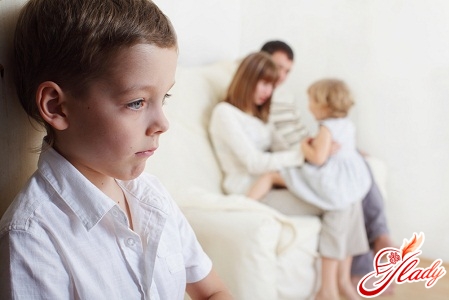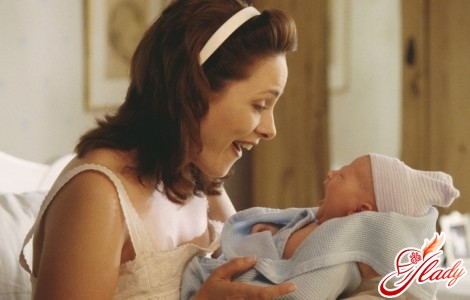 The appearance of a baby in the family is a difficult time for the older child.In many cases, it is not without problems. First of all, in a form accessible to his age, the older child needs to be told about childbirth and taught how to handle the newborn.
The appearance of a baby in the family is a difficult time for the older child.In many cases, it is not without problems. First of all, in a form accessible to his age, the older child needs to be told about childbirth and taught how to handle the newborn.
When is it best to announce pregnancy?
If your child is worried about your badwell-being in the morning, you can explain to him right away that you are expecting a baby (brother or sister). But in this case, he will have a long wait, small children do not have a correct idea of time and it will be necessary to often explain to him that the moment of the baby's appearance has not yet arrived. You can postpone the announcement of the pregnancy until the second half of it, you can postpone it until the last moment, when the pregnancy becomes noticeable. The baby's birth date can be made more understandable to the child if you associate it with some significant event or time of year. You can keep a special calendar with your child, which will also help you, otherwise the older one will constantly ask when the newborn will be born. Some parents are reluctant to announce the pregnancy, because they do not want the child to feel pushed into the background. But postponing the conversation, you will not solve the problem. Try to tell your child about the pregnancy early enough so that you have the opportunity to help him get into a positive mood and join in joint preparation for the arrival of the newborn. When discussing the arrival of a new brother or sister with your child, give examples of families you know who have several children. Find out what he already knows about pregnancy and childbirth and try to correct his misconceptions, tell him about what he doesn’t know, and answer his questions. At the same time, try not to overload the little child with an abundance of information.
- Read books on pregnancy, childbirth, newborns, and how an older brother or sister should behave with a child.
- Give the child to listen to the baby's heart beatingand feel his movement. Talk to your child about the development of the fetus. Tell him that the fetus already knows how to do (for example, hiccough, sucking a thumb, hearing, kicking).
- Show your child photos and videos of the time when he was a baby, pay attention to those of them where you or his father look after him, like a newborn.
- Let your child watch the babies, and play them. Pay attention to the fact that they are small and sometimes do not understand how to play.
- Ask the child to help you collect all the things you need for the hospital. If he has to stay with someone else while you are in the hospital, prepare the child and everything you need.
- In advance, a few months before the birth, dorearrangement in the nursery or bedroom, so that after the birth of the baby the oldest child suddenly did not feel superfluous. Put the baby cot so that the older child is used to the fact that the baby will be sleeping here.
- Allow the child to decide when and how long to discuss the upcoming birth and the appearance of the baby. Be tactful and do not overload your child with talk about a newborn.
Separation from mother at the time of birth
Your child's experience during your stayin the maternity hospital depends largely on his age and how he is cared for in your absence. Most children, to one degree or another, have experience of separation anxiety, in which they were worried, cried, called for their mother, clung to other people, were often irritated, had difficulty falling asleep and were angry. When their mother returns, most children are very happy about this, but some children continue to misbehave and even ignore their mother. In this way, children express their fear of loneliness. There is much you can do to reduce your child’s anxiety about your separation. In the last weeks of pregnancy, tell your child that you are going to the hospital. If possible, go to the hospital with your child. Explain to your child where he will be staying (at home or visiting) and who will take care of him while you are away. The child will be less anxious if he is well acquainted with the person who will look after him in your absence. A close friend or relative will make your separation less painful for the child. When labor begins, tell your child when you will be leaving and where you are going. If your child is not yet able to take full care of himself (for example, take a bath or go to bed), the role of the father and other adults with whom the child is well-disposed is greatly increased in the period before labor. It is desirable for the child to have a clear daily routine that will not be too much disrupted by your hospitalization or the arrival of the newborn. Consider having your child visit the hospital to see you and the newborn. Early interactions between children greatly contribute to the emotional atmosphere of the family, and many maternity hospitals allow such visits. He may be reassured by the sight of you and the baby, and such a visit will play a positive role. However, he may ignore you and the newborn, or become too clingy and start crying when it is time to leave. And you will feel that it is better for both of you to avoid such visits altogether. It is understandable that it is difficult for a small child to see you for a short time and not be able to stay with you, but even a short meeting will make him happy and help him calm down. Negative reactions from a child indicate that he is experiencing stress, and a visit to the hospital gives him an opportunity to express his anger and disappointment. If the child cannot visit you, you should establish contact with him in some other way - by calling on the phone, sending photos, notes and gifts.
Appearance of the newborn in the house
 It's not just separation from your mother that will be a concernyour child, but also the constant presence of a helpless, crying newborn who demands attention. After the baby is born, life becomes different for your older child. The parents who previously belonged entirely to him or her suddenly became unavailable, and all because of the newborn! Older children react to this in different ways: with temporary outbursts of anger, demanding attention to themselves, returning to their childhood habits, such as sucking a thumb, asking for a bottle or breastfeeding, wet pants, increased attention to the baby, aggressive behavior towards parents and the newborn (may hit, bite, throw things around), as well as unwillingness to eat and sleep on time. Sometimes parents who have never encountered such behavior from their child before are very surprised. Often children calm down quickly, but in some cases it may take weeks and months before your child begins to normally perceive the appearance of a newborn in the family. Children of different ages react to the appearance of a newborn in their own way. Children aged 3-4 years, as a rule, immediately understand what influence a newborn has on their relationship with their parents, older children may be offended by the baby, feel guilty and try to hide this feeling from their parents. Perhaps the best way to help your older child is to accept any form of his behavior. Try not to be upset. Accept his behavior as a given and continue to communicate with the child as if nothing had happened. Try to set the child up positively for the appearance of a newborn in the family:
It's not just separation from your mother that will be a concernyour child, but also the constant presence of a helpless, crying newborn who demands attention. After the baby is born, life becomes different for your older child. The parents who previously belonged entirely to him or her suddenly became unavailable, and all because of the newborn! Older children react to this in different ways: with temporary outbursts of anger, demanding attention to themselves, returning to their childhood habits, such as sucking a thumb, asking for a bottle or breastfeeding, wet pants, increased attention to the baby, aggressive behavior towards parents and the newborn (may hit, bite, throw things around), as well as unwillingness to eat and sleep on time. Sometimes parents who have never encountered such behavior from their child before are very surprised. Often children calm down quickly, but in some cases it may take weeks and months before your child begins to normally perceive the appearance of a newborn in the family. Children of different ages react to the appearance of a newborn in their own way. Children aged 3-4 years, as a rule, immediately understand what influence a newborn has on their relationship with their parents, older children may be offended by the baby, feel guilty and try to hide this feeling from their parents. Perhaps the best way to help your older child is to accept any form of his behavior. Try not to be upset. Accept his behavior as a given and continue to communicate with the child as if nothing had happened. Try to set the child up positively for the appearance of a newborn in the family:
- Before the birth of a newborn, play with the doll showing how the child cares for her.
- Stay alone with your older child, play with him in his favorite games during a newborn's sleep or when someone else is looking after him.
- Give the older child as much attention as possible. Not responding to his requests and comments, you thereby demean your child's self-esteem in such a difficult period of his life.
- If the child behaves badly, do itremark, as usual. Do not allow the older child to cross the permitted boundaries and violate the rules of conduct adopted in the family. You should not feel guilty that another child has appeared in the house, let alone show this feeling.
- Express your emotions about the troubledbehavior of the baby with the older child, share your concerns with him, this you will help and formulate and throw out your discontent with the loud crying of the baby or your constant cares about him.
- After returning from the hospital, celebrate the birthday of a new member of the family with a treat for everyone. Give the older child a gift and advise him to make or find a gift for the baby.
- If the child wants to help you take care ofnewborns, allow him to perform some duties according to this age: hold the baby, change diapers, dress and bathe, help feed or make the kid laugh, sing to him and talk to him.
- If the older child does not want to take care of the baby, do not force him to do it.
- Do not try to impose a love for a baby on the older child, show tact and patience in matters of their relationship.
- Help your older child realize that he or she can do many things that a toddler cannot yet do, such as blowing up balloons, making cookies, or washing dishes.
- Do not forget about yourself. Rest when possible. This does not diminish the feelings of resentment or jealousy of older children, but it will be easier for you to cope with it.
Remember that it is difficult for the older child sometimesIt can be painful to adjust to the arrival of a newborn, but this is part of the normal life experience. Your efforts should be aimed at ensuring that the older child does not feel disadvantaged, and most importantly, that he or she perceives this event normally and, with your support, treats the newborn correctly. We recommend reading:









